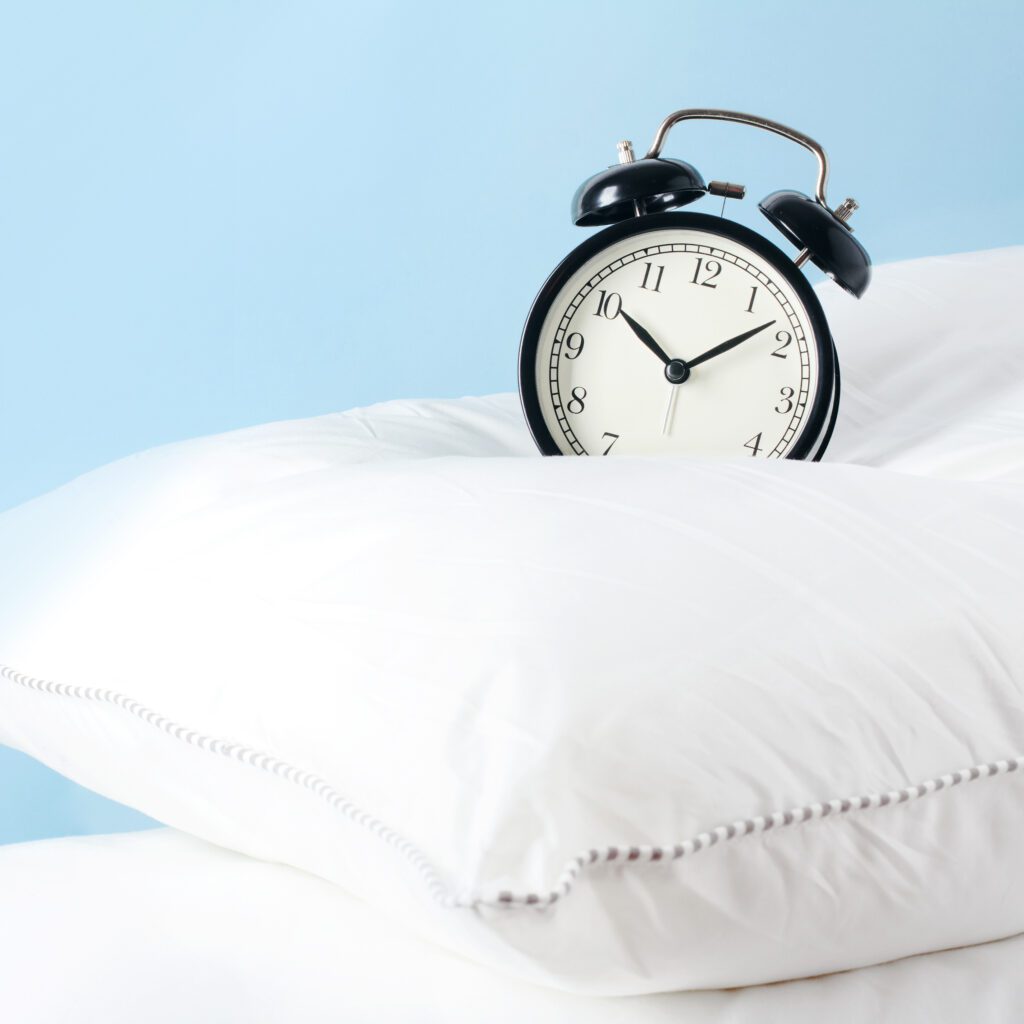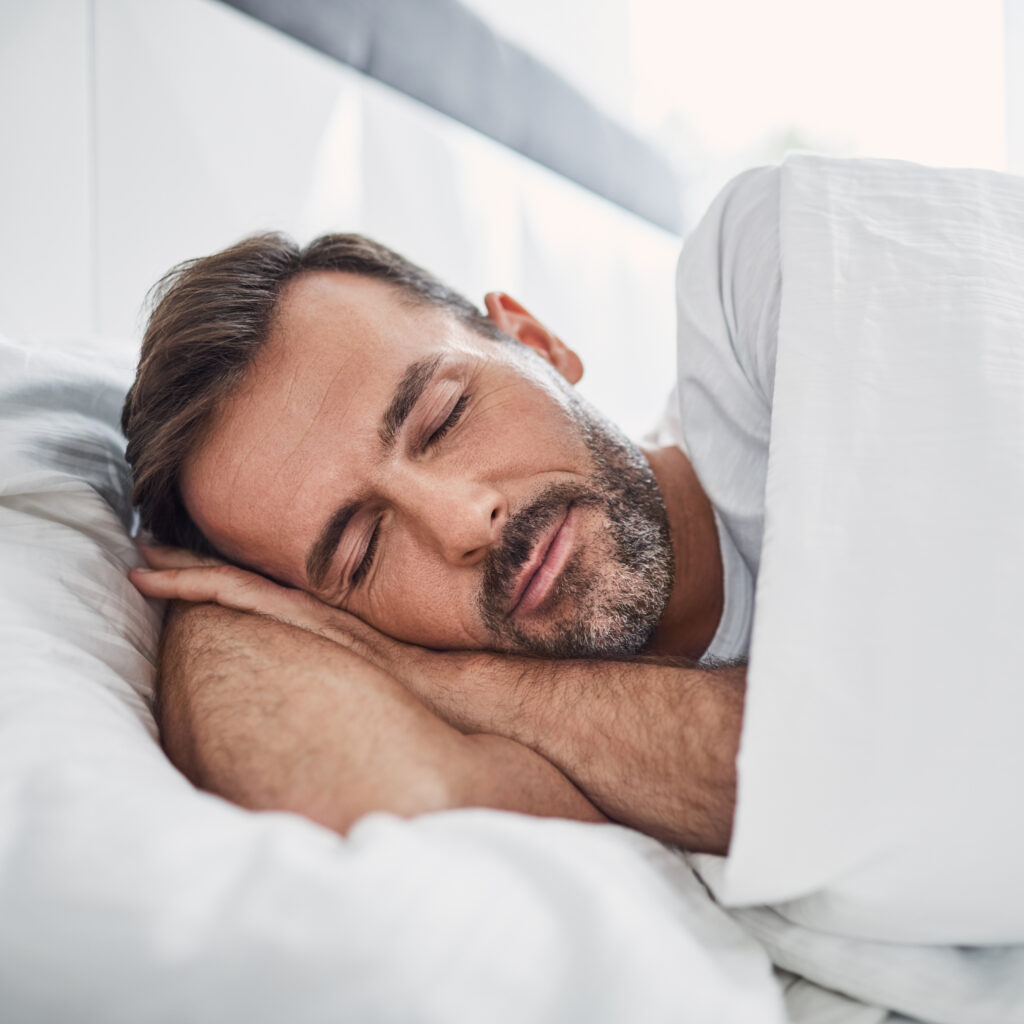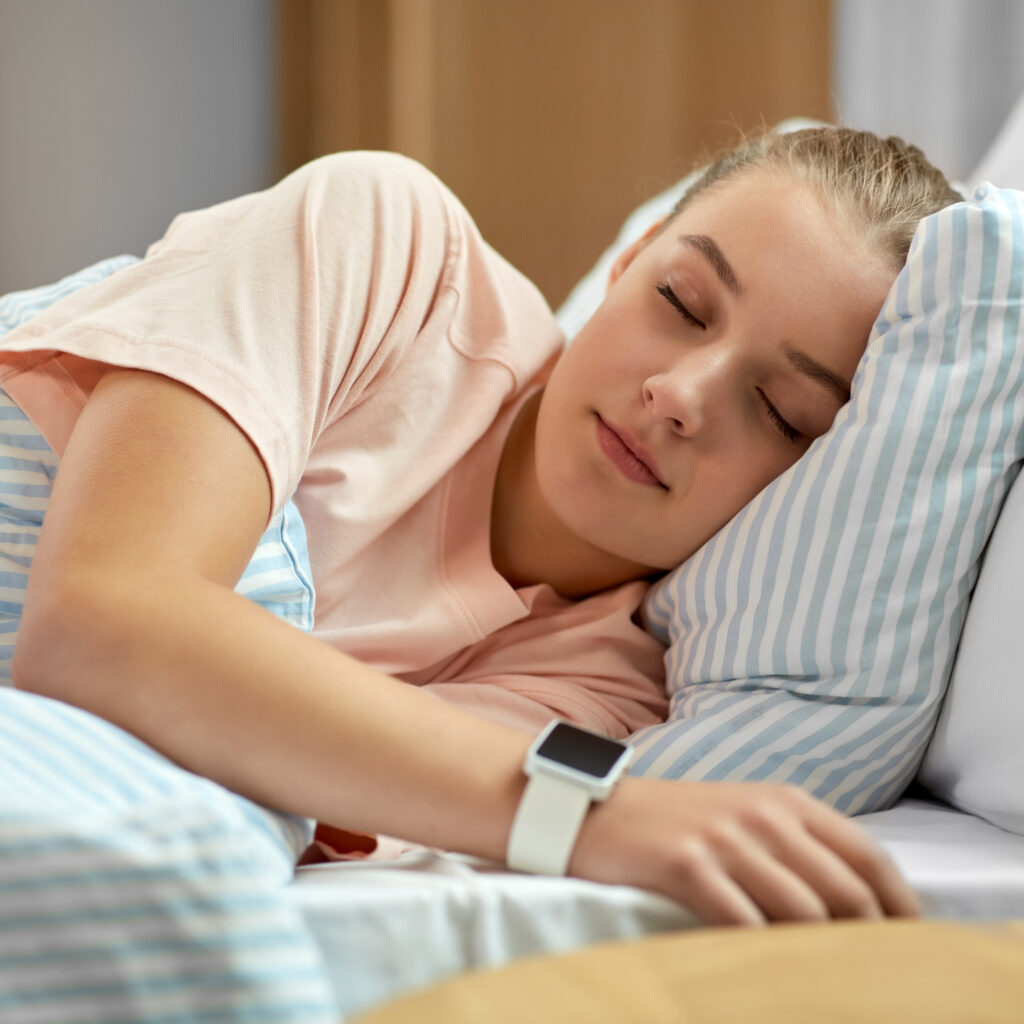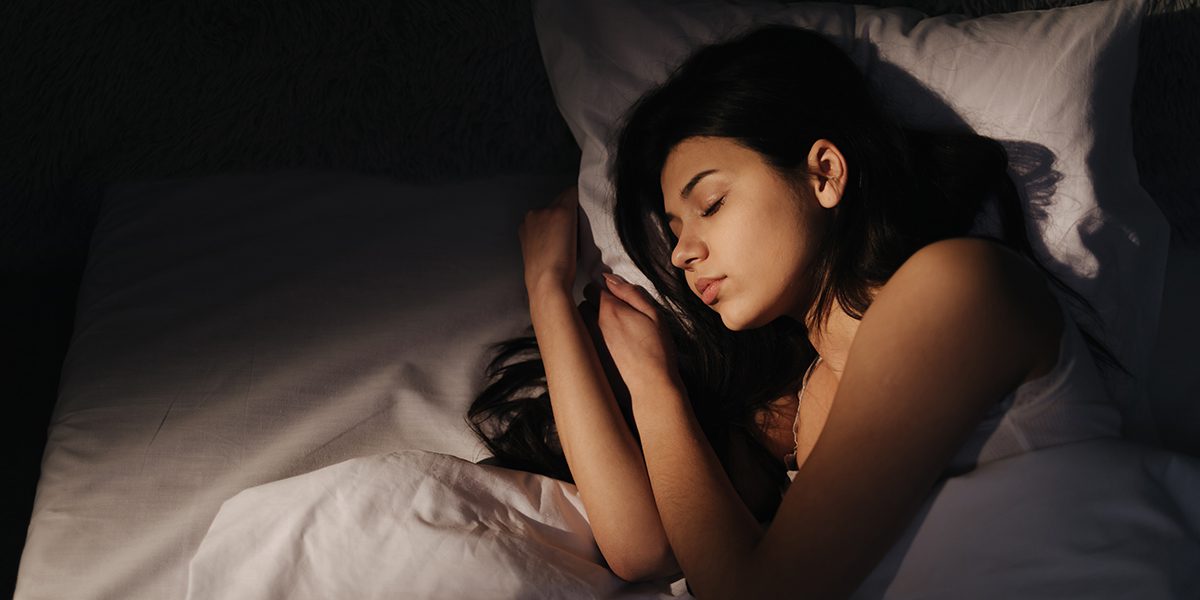WRITTEN BY WOODSIDE DIRECTOR OF TRAINING, JOHN BEANE
As mentioned in previous articles, to optimize the health of our clients here at Woodside, the Training team goes beyond the typical movement-based models used in the fitness industry and coaches through the lenses of movement, nutrition, recovery and mindset. In this article we are going to dive into recovery with what many consider to be the king of the category: sleep. Sleep is a fundamental biological process essential for optimal physical and cognitive functioning. In recent years, the role of sleep in performance and recovery has garnered significant attention from both researchers and practitioners. Adequate sleep is not merely a passive state of rest but a dynamic period during which the body and mind undergo critical restorative processes.
This article explores the science and physiology of sleep as well as its impact on performance and recovery and offers recommendations for optimizing sleep hygiene and environment. Before we jump into the information here, I would like to mention that we understand each individual’s schedule and commitments are unique to them so it is important to simply do the best you can within your own schedule. I can remember being a new parent and how frustrated I was listening to wellness podcasts and reading articles on how crucial sleep was for optimal health. My priority during that time was not getting great training sessions in and taking on extreme biohacking, it was taking care of our new little boy and trying to not mess up the DoorDash order. So, take in the information, do your best, but be warned, this may not be the best news if you’re trying to clear out your Netflix queue.
THE SCIENCE AND PHYSIOLOGY OF SLEEP
To get a better understanding of sleep we’ll start with the sleep stages and cycles. Sleep is composed of two primary states: non-rapid eye movement (NREM) sleep and rapid eye movement (REM) sleep, which cycle throughout the night. NREM sleep is further divided into three stages, with each serving distinct physiological functions. Stage 1 is the lightest stage, facilitating the transition from wakefulness to sleep. Stage 1 is also known as the “why was I thinking about that random thing” stage. Stage 2 constitutes a period of light sleep where heart rate and body temperature decrease. Stages 3 and 4, also known as slow-wave sleep (SWS), are critical for physical recovery, characterized by the release of growth hormones and tissue repair. REM sleep, on the other hand, is essential for cognitive processes such as memory consolidation and emotional regulation. During REM sleep, brain activity resembles wakefulness, but the body remains immobile to prevent acting out dreams.

Sleep also plays a pivotal role in regulating hormones critical for performance and recovery. Growth hormone, which stimulates tissue growth and repair, is predominantly secreted during SWS. Sleep also influences cortisol levels, with chronic sleep deprivation leading to elevated cortisol, which can impair muscle repair and increase the risk of chronic conditions (Van Cauter et al., 2000). Additionally, sleep modulates appetite-regulating hormones such as leptin and ghrelin, influencing energy balance and body composition. Leptin, which signals satiety, decreases with sleep deprivation, while ghrelin, which stimulates hunger, increases, potentially leading to weight gain and metabolic disturbances.
The quality of sleep, rather than just the duration, is crucial for effective recovery and performance. Poor sleep quality, characterized by frequent awakenings and disruptions in the sleep cycle, can lead to significant impairments. Research indicates that fragmented sleep adversely affects the body’s ability to repair tissues, modulate immune function, and maintain cognitive performance (Krause et al., 2017). Sleep quality is often measured by parameters such as sleep latency, sleep efficiency and the number of awakenings throughout the night. High sleep efficiency and minimal disruptions are markers of good sleep quality, which are essential for maximizing the restorative benefits of sleep.
SLEEP FOR PERFORMANCE AND RECOVERY
Sleep is indispensable for physical performance. Athletes, for instance, rely on sleep for muscle recovery, energy replenishment and injury prevention. Studies have shown that sleep deprivation can reduce muscle glycogen synthesis, decrease endurance and impair motor skills (Reilly & Edwards, 2007). Conversely, sufficient sleep enhances strength, speed and coordination, as well as reducing the risk of injury.
The Stanford Basketball Sleep Study provides a compelling example of the benefits of increased sleep on athletic performance. In this study, college basketball players were asked to extend their sleep to 10 hours per night for five to seven weeks. The results showed significant improvements in various performance metrics, including a 9% increase in free-throw accuracy and a 9.2% improvement in three-point shooting percentage. Additionally, players reported better reaction times, mood and overall physical and mental well-being (Mah et al., 2011).

Sleep also has a profound effect on cognitive function: attention, decision-making and reaction time are all profoundly affected by sleep. Sleep deprivation impairs neurocognitive processes, leading to decreased alertness and slower reaction times (Durmer & Dinges, 2005). This is particularly detrimental in high-stakes environments such as sports, academic performance, professional settings where optimal cognitive function is paramount and deciding which smoothie you want from the Earthbar. Sleep plays a crucial role in the consolidation of memories and learning, making it indispensable for both short-term and long-term cognitive performance.
RECOMMENDATIONS FOR OPTIMAL SLEEP ENVIRONMENT AND HYGIENE
Creating an optimal sleep environment is essential for improving sleep quality. Key factors include:
- Darkness: Exposure to light, particularly blue light from screens, can suppress melatonin production. Using blackout curtains and limiting screen time before bed can enhance sleep quality. Melatonin is a hormone that regulates sleep-wake cycles, and its production is inhibited by light exposure. This is first on the list because it is the most frequent obstacle we see when coaching our clients toward better sleep practices.
- Temperature: Maintaining a cool room temperature, around 60-67°F (15-19°C), facilitates the natural drop in body temperature necessary for sleep. A cooler environment helps initiate sleep onset and promotes deeper sleep stages.
- Comfort: A comfortable mattress and pillows that provide adequate support can prevent discomfort and promote uninterrupted sleep. The choice of bedding materials that wick moisture and provide good ventilation can also enhance sleep quality.
Adopting good sleep hygiene practices can significantly improve sleep quality. Recommendations include:
- Consistent Sleep Schedule: Going to bed and waking up at the same time every day helps regulate the body’s internal clock. Consistency reinforces the sleep-wake cycle and improves the ease of falling asleep and waking up.
- Pre-Sleep Routine: Engaging in relaxing activities such as reading, meditation or taking a warm bath can signal the body that it is time to wind down. Avoiding stimulating activities and bright lights before bedtime can facilitate the transition to sleep.
- Avoid Stimulants: Limiting caffeine, particularly in the hours leading up to bedtime, can prevent sleep disturbances. Caffeine can delay sleep onset and reduce sleep quality. There is no absolute answer here on how many hours before bed you should abstain from stimulants because everyone’s physiological processes differ, but we would recommend you err on the side of caution and make adjustments based on your individual reaction.
WEARABLE SLEEP TECHNOLOGY
Advancements in wearable technology have made it easier to monitor and improve sleep quality. Devices such as fitness trackers and smartwatches are equipped with sensors that track sleep patterns, duration and quality. These devices use data from movement, heart rate and even skin temperature to provide insights into sleep stages and disturbances. Wearable sleep technology can offer personalized feedback and recommendations for improving sleep hygiene. For example, some devices provide gentle alarms that wake users during lighter stages of sleep, potentially reducing grogginess upon waking. Others may offer insights into environmental factors such as room temperature and noise levels that could be affecting sleep quality.

These wearables continue to evolve and improve as new versions get released. We would recommend first choosing a piece that you’ll be comfortable with (i.e. a wrist strap vs. a ring), keeping it in a place you’ll remember to wear it (the more data the better with these pieces) and making sure it includes HRV (Heart Rate Variability) as an output. Our final thought here is to make sure that you use your best judgement in utilizing the data you receive through these wearables. For example, if you wake up feeling energized and rested but your wearable says your recovery is suboptimal that does not necessarily mean you have to skip training that day and vice versa. Listen to your body and make the best decisions from there.
The importance of sleep for performance and recovery cannot be overstated. Both the quality and quantity of sleep are vital for physical, cognitive and hormonal functions. By understanding the science of sleep and adopting practices that promote good sleep hygiene and an optimal sleep environment, individuals can enhance their performance and facilitate recovery, leading to overall improved health and well-being. If you fell asleep reading this no need to feel guilty, it just means you’ll be more ready to train!
Our team of Trainers can help you incorporate a focus on sleep into your fitness routine. To learn more click here or email us.
References
Durmer, J. S., & Dinges, D. F. (2005). Neurocognitive consequences of sleep deprivation. *Seminars in Neurology, 25*(1), 117-129.
Krause, A. J., Simon, E. B., Mander, B. A., Greer, S. M., Saletin, J. M., Goldstein-Piekarski, A. N., … & Walker, M. P. (2017). The sleep-deprived human brain. *Nature Reviews Neuroscience, 18*(7), 404-418.
Mah, C. D., Mah, K. E., Kezirian, E. J., & Dement, W. C. (2011). The effects of sleep extension on the athletic performance of collegiate basketball players. *Sleep, 34*(7), 943-950.
Reilly, T., & Edwards, B. (2007). Altered sleep-wake cycles and physical performance in athletes. *Physiology & Behavior, 90*(2-3), 274-284.
Van Cauter, E., Leproult, R., & Plat, L. (2000). Age-related changes in slow wave sleep and REM sleep and relationship with growth hormone and cortisol levels in healthy men. *JAMA, 284*(7), 861-868.
